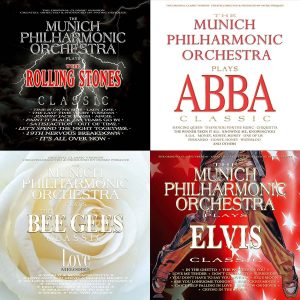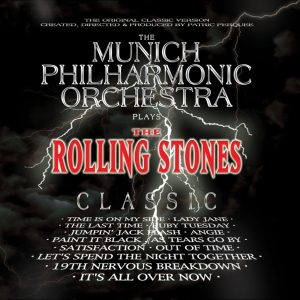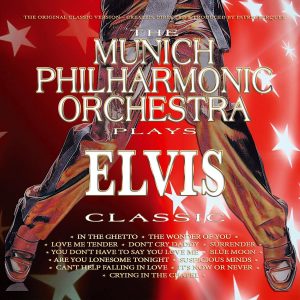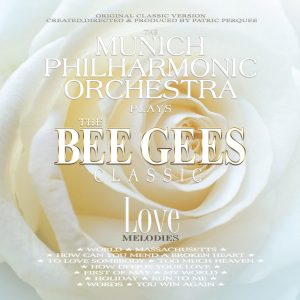- Munich Philharmonic Orchestra01 - S.O.S. 3:21
- Munich Philharmonic Orchestra02 - The Winner Takes It All 4:59
- Munich Philharmonic Orchestra03 - Dancing Queen 3:51
- Munich Philharmonic Orchestra04 - Knowing Me, Knowing You 4:07
- Munich Philharmonic Orchestra05 - One Of Us 3:56
- Munich Philharmonic Orchestra06 - Chiquitita 5:25
- Munich Philharmonic Orchestra07 - Thank You For The Music 3:52
- Munich Philharmonic Orchestra08 - Dance (While The Music Still Goes On) 3:31
- Munich Philharmonic Orchestra09 - Money, Money, Money 3:06
- Munich Philharmonic Orchestra10 - Fernando 4:25
- Munich Philharmonic Orchestra11 - Honey, Honey 3:08
- Munich Philharmonic Orchestra12 - Hasta Mañana 3:08
- Munich Philharmonic Orchestra13 - Waterloo 2:58
Dear music lovers,
I am glad that you are listening to my production ‘The Munich Philharmonic Orchestra plays ABBA Classic‘. This recording was produced by those involved with much love and enthusiasm. I did not use modern digital techniques to suppress the sounds which necessarily occor when acoustic instruments are used but to guarentee you the sound of the real orchestra as experienced at a live concert.
Enjoy yourself.
Yours,
Patric Perquee
The ’Eurovision Song Contest’ has been staged since 1956 with a trail of winners over the decades. Yet only one group performed the feat of converting this success into a worldwide career. In 1974 Agnetha, Björn, Benny and Anna – ABBA for short – entered the fray for Sweden with the song ‘Waterloo’ and their uplifting, upbeat sound captivated not only the jury, but won over millions across the globe. They went from strength to strength, taking the charts by storm with an unprecedented string of hits: ’Fernando’, ’S.O.S.’, ’Dancing Queen’, ’Knowing Me, Knowing You’, to name just a few. All the songs bore the unmistakeable hallmarks of ’ABBA’ compositions, yet the sound characteristics of the instruments were musically modulated to lend each track an identity of its own.
When ’ABBA’ broke up over a decade later, their legacy was a series of evergreens which today not only enjoy popularity among cover artists, but have advanced to classic status in the realms of pop music. In 1991 the Hamburg producer, Patric Perquee, rose to the awesome challenge of recording these songs with a classical orchestra: a unique project calling for the best artists of their genre – the Munich Philharmonic Orchestra. Conducted by Sergiu Celibidache, it has matured into one of the most dynamic and exciting orchestras in the world.
The evening before recording, the members of the Munich Philharmonic Orchestra conducted by Celibidache, played Anton Bruckner’s 7th Symphony in E Major in full evening dress before hundreds of festively dressed, eager music lovers. The next day saw the precious Stradivarius clamped between a stubbled chin and a lumberjack shirt in the studio, where looks take back seat. ’To ensure a perfect sound experience, the only musicians who come into question for me are the best’, says Patric Perquee. ’Of course it was great in the eighties to play an active part in forging the meteoric development of computer technology and its influence on music. But if you are always sitting in front of the monitor, there comes a time when it starts to jade.’ The computer soon lost its fascination for Patric Perquee. He wanted to explore new terrain, to widen his horizon. That’s how he became a frontier runner between pop and classical music.
’From a technical point of view, the recording is capable of guaranteeing the perfect sound experience. So, the three-dimensional sound impression I get from the orchestra in concerts in the Philharmonic Hall at Gasteig must come across when the music is played at home.’
Under the producership of Patric Perquee, the artists have transcended the great divide between classical music and light music. Do objective criteria exist for measuring the success of treading this tightrope?
’It isn’t your ear which tells you whether the recording has come off. It’s the frisson, the feeling that every note gets deep under your skin and creates vibes there. That’s the point when the erotic effect of music begins to unfold.’ For Patric Perquee, born in 1954, a successful pop producer for many years, the ultimate gauge for judging his own work is the sensations he experiences.
For outsiders it is difficult to comprehend how, in the austere atmosphere of a studio, emotions can be engendered inspiring musicians’ top performance and arousing those listeners’ feelings which spell the success of a music production. Yet this is the very secret of ’ABBA’ melodies, which unleash their magic beyond the constraints of time and place. The first release of the ’ABBA Hits’ played by the Munich Philharmonic Orchestra heralded the revival of the Swedish pop group. Sales soared to record level again, fans hoped that the group would reunite – regrettably in vain.
’The Munich Philharmonic Orchestra plays ABBA, The BEE GEES, ELVIS, The ROLLING STONES Classic’ – a trademark for outstanding sound artistry – created, directed & produced by Patric Perquee.
T.A.
Audio samples do not correspond to the original length and original quality !


® All rights reserved | © Copyright by Giacomo Records
Web-Creation by Sencillo Design&Sound / Vienna









